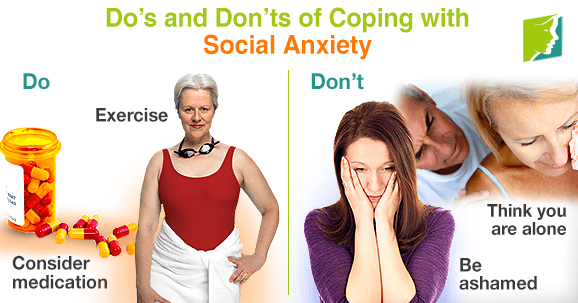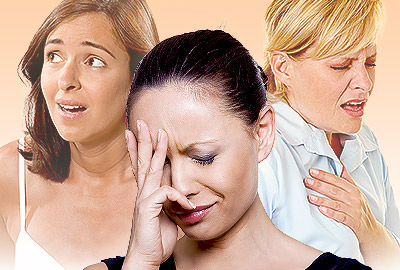Everyone experience anxious and embarrassed feelings on occasion, which is normal. Social anxiety disorder is characterized by the overwhelming fear of being judged by others and being embarrassed in public. Social anxiety interferes with one's ability to face every day social situations, like parties, interacting with strangers, and eating in public. Anxiety disorders affect around 40 million Americans on average every year and occur two times more in women than in men. However, there are several helpful ways to cope with social anxiety.
What Is Social Anxiety?
Social anxiety can develop as early as infancy, but typically starts during adolescence. Social anxiety disorder is the intense fear of being humiliated in public and is characterized by extremely self-conscious feelings in everyday social situations. People with social phobia have a strong fear of being watched and judged by others. People with social anxiety are typically extremely shy, and have difficulty facing social situations - like public speaking, eating and drinking in front of others, and talking to people, especially strangers.
Most people with social anxiety know that it is irrational, but cannot control it. Social anxiety can be triggered by previous emotional trauma, stress, hormone fluctuations, and genetics. Common symptoms of anxiety include rapid heartbeat, sweating, trembling, nausea, and avoiding social situations altogether in fear of being embarrassed. Below are some tips for coping with social anxiety.
DO Receive psychotherapy
Cognitive behavioral therapy is a type of psychotherapy that is popular for treating social anxiety. It teaches the patient a different way of thinking and behaving in social situations in order for them to feel less fearful and anxious.
DON'T Leave it Untreated
Symptoms tend to get worse if left untreated, so it is important to see a doctor if you think you have social anxiety. Doctors will be able to properly diagnose you and determine which treatment option is best for you.
DO Consider medication
Anti-anxiety medication can be effective in treating social anxiety. Beta-blockers and benzodiazepines are commonly prescribed for social anxiety. Beta-blockers work by blocking the adrenaline hormone, causing the heart to beat slowly and with less force. Benzodiazepines have a sedative effect on the nervous system.
DON'T Be Ashamed
It is crucial to remember that you are not alone in experiencing social anxiety. Social anxiety is a common disorder, and there are millions of others dealing with the same condition.
DO Exercise
Exercising for around 30 minutes a day (or at least five times a week) has also been known to reduce stress, improve mood, and increase energy. Exercising releases “feel-good ” neurotransmitters, like serotonin, in the brain. Yoga, walking, and swimming are all excellent low-impact workouts that are effective in combating anxiety.
DON'T Think You Are Alone
There are support groups for social anxiety that can be very helpful. While talking to a group of strangers seems intimidating, it can be a useful resource because people in these groups share similar experiences and offer advice.
Social anxiety can interfere with personal relationships and inhibit the ability to face every day social situations. There are several helpful treatment options for social anxiety, like psychotherapy and exercising. It is important not to go untreated or be embarrassed about experiencing social anxiety. It is a common disorder that affects millions of Americans every year. Read more about effective ways for treating anxiety.
Sources
- National Institute of Mental Health. (n.d.). Anxiety Disorders. Retrieved October 2, 2014, from http://www.nimh.nih.gov/health/publications/anxiety-disorders/index.shtml
- National Institute of Mental Health. (2008). Introduction: Mental Health Medications. Retrieved October 2, 2014, from http://www.nimh.nih.gov/health/publications/mental-health-medications/index.shtml#pub7
- National Institute of Mental Health. (2013). Social Phobia (Social Anxiety Disorder): Always Embarrassed. Retrieved October 2, 2014, from http://www.nimh.nih.gov/health/publications/social-phobia-social-anxiety-disorder-always-embarrassed/index.shtml




